Delicious. What a powerful first act that could have easily served as the introductory piece for the show. Aoi Bungaku treated us in the first episode with his ‘departure’ from humanity, and now it leads us to where he departed to: the ‘beingness’ of a monster.
Aoi Bungaku is an adaptation of critically acclaimed Japanese literature that enjoys the status as classics. I have not read these stories, and probably would not be able to do so for some time, but the subject matter is rather timeless, if I may say so: the nature of being human, of evil. The story looks harshly into this, as harsh as the flash of a photograph must feel for an insecure boy in the dawn of the Showa Era.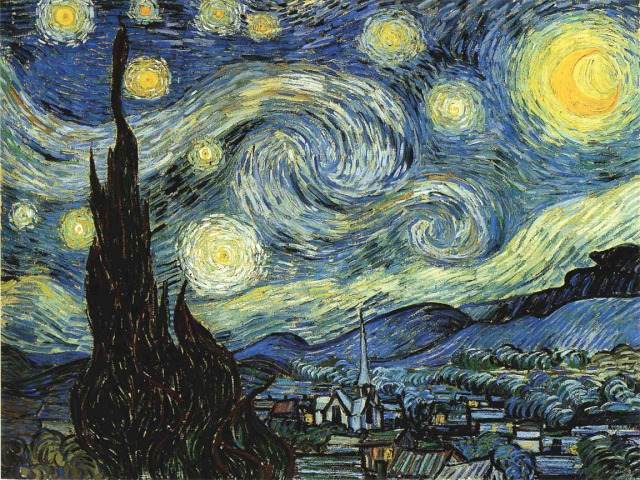
“All my life I’ve been flattering people around me… mainly because… I was afraid of them.”
We see Youzo as a young boy forcing a smile for the photograph. Photography wasn’t exactly commonplace then, and I suppose there could be something terrifying about the contraption pointed at the subjects like a weapon, as well as the flash that explodes as if with gunpowder.
But Youzo is talking about fear of other people here. The camera is but an instrument.
“As I think back, I think I was clowning.”
This is the second reference to clowning. In the first episode, Youzo’s conspirator in the ‘anti-social’ movement praised him for his acting. He brushed it off and said he was just clowning.
Acting = Art (connotation of beauty and truth) | Clowning = (merely) playing around, perhaps deceitfully
Children his age terrified him — a physical challenge, to jump and grab on to a horizontal bar is literally out of his reach. In his flashback they all surround him, with a menacing buzz of snickering. This contrasts with his commentary on the scene: “As a human I can share someone’s affection, at least as the last resort.” When he fails to grab on to the bar, he passes it off as clowning — the menacing snickering turns to perhaps appreciative laughter. This, to Youzo, is ‘connection’ with humans.
A squint-eyed kid taps him on the shoulder, saying “fake… fake…”
Further clowning, he drops his pants in class, he sees the same kid see through his act. After class the short kid wipes his nose on his sleeve and is without an umbrella in the rain. Youzo doesn’t have an umbrella to offer him, but he takes him to his house, which is near.
The runty kid’s ear hurts, and Youzo cleans it with one of those wooden sticks. I remember those, as my younger brother used them even when there were plenty plastic and cotton ear buds. I remember my mother cleaning my brother’s ears the same way Youzo did the runty kid’s, who now acknowledges Youzo’s kindness, noting how he must be popular with the girls.
Youzo’s motive becomes transparent immediately: “We’re friends now. That’s why you should be sure not to badmouth me in front of others.” The kid reacts to this by calling him a monster, telling Youzo that a monster is his true identity.
“Hey, people always called me cute, handsome, or interesting. But I’ve never heard anyone call me a monster.” He sees his monstrous reflection hover over the kid.
I think at this point, Youzo tries to clown his way out of this frightening exchange. He ‘admits’ to being a monster, while putting on a ‘hahaha lolololol’ mien. But his laughter is hysterical, then he breaks down… only to wake up on his hospital bed remembering Mayumi who he killed.
A nurse stands over him, asking him if he remembers his identity. He responds with, “A monster.”
But what is a monster here? The monster so far is defined by his clowning, out of a need to control or manipulate others, which in itself born out of an abject fear of them. The camera is easily enough a symbol of being captured. One’s image is caught on film, and Youzo can easily feel ‘exposed’ by it.
Monstrosity, implies evil, and evil is fundamentally deceit. I have gone to some lengths talking about inauthenticity in last season’s Bakemonogatari, without going further into what inauthenticity means. It is in itself a deceit, and it is a fundamental part of what is commonly ascribed to evil.
In Judeo-Christianity (I mention this only because it is what I am familiar with) Satan. “the enemy” is given the title “the prince of lies.” The first truly evil act was the temptation of Eve in the Garden of Eden. What was evil about the temptation? Deceit, in that the serpent spoke as if he had Eve and Adam’s best interests.
So we see here in two religious belief systems the first evil act is deception, is manipulation. We see this in Youzo, in his clowning, in his false offers of friendship. This is why it is a logical leap for him to relate to himself as a monster.
A monster is a being of lies.
I now wonder at what Youzo is crying about: Mayumi’s death, or how his father disowned him for fear of scandal… perhaps both? Perhaps it’s his own acknowledgment of how evil he has become.
It might well be, since he started playing up his monstrosity to himself: he starts misrepresenting the events that lead to Mayumi’s death, giving it more scandalous airs. This is delicious, in that he has resorted to some form of self-flagellation — such a terrible conceit and self-deceitful many times over. He’s clowning to himself!
Then a treat of a flashback: Youzo’s ‘bought’ friend showed him a print of Vincent van Gogh’s self portrait, calling it ‘the portrait of a monster. Vincent van Gogh is now regarded as one of the greatest painters ever, and his work is said to have contributed much of the art that succeeded him. Van Gogh is interesting here also because he suffered mental illness and fought bouts of anxiety for most of his life, until shooting himself at age 37.
He was largely unknown, despite his considerable output. His mental illness is quite romanticized, and is told thusly to have influenced much of his work. Aoi Bungaku is part of this romanticism, albeit very interestingly so by calling Van Gogh a monster outright, as opposed to the fawning kind of remembering love, as the singer-songwriter Don Mclean wrote this tribute for.
From the Wikipedia article:
van Gogh’s sordid relationship with Paul Gauguin,[2] with whom he had, as with many others, a complex sort of relationship, which was so intense as to lead Van Gogh to think it rational to cut off a part of his left earlobe as a sign of cutting Gauguin out of his life and heart. That led Gauguin, who had also had severe bouts of depression and suicidal tendencies, to distance himself from van Gogh, tumbling the already troubled artist into a schizophrenic depression, the theoretical straw that broke the camel’s back.
Youzo attempts to copy van Gogh’s self-portrait, and somehow, the monster that he’s been seeing in the reflection results in the canvas. It emerges form the page, as if to devour him. Youzo realizes that it’s something he can do. He can draw monsters, he can draw “the real me.” He starts drawing the monster feverishly, but when he starts remembering Mayumi’s words, about wanting to be reborn a human, he rips apart his drawings and finds blood on his hands.
“This is not right. A monster cannot live in a human world.”
He attempts to escape the prison room his father the Congressman built for him, resolving to live like a human being, but he sees his monster self climbing down after him. He tries to reach out to a fellow artist, his partner in the con-game (Horiki; it’s unclear to me if this is the friend he bought as a child), but Hoiriki made fun of him in polite company. Dejected, Youzo leaves. The lady reporter who once rejected the offer to chase Youzo’s story shows concern, but the artist (a comic strip illustrator, perhaps) dismisses it as just one of Youzo’s acts.
The reporter’s editor boasted to her that Youzo’s story is just the kind of thing that (older) women would eat up, and she found this insulting perhaps. And yet she found herself chasing Youzo, and inviting him to her home where she lives with her young daughter. Like Mayumi, her husband is gone (perhaps dead).
“My house is not up to human standard, so I hope you don’t mind.”
Who’s she kidding? She’s about to let a monster into her family.
Further Reading
Vincent van Gogh on Wikipedia [->]
van Gogh’s posthumous fame [->]
Gaguin vs. van Gogh! My ears! [->]
Inauthenticity, being, and Bakemonogatari, the WRL coverage [->]

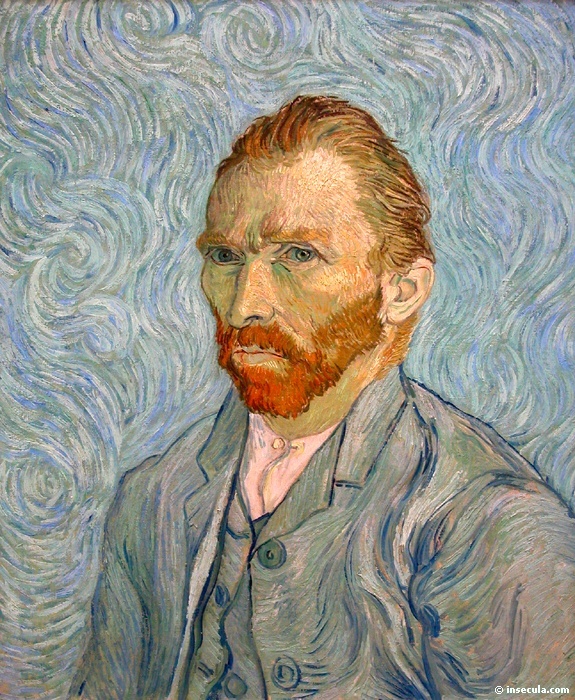
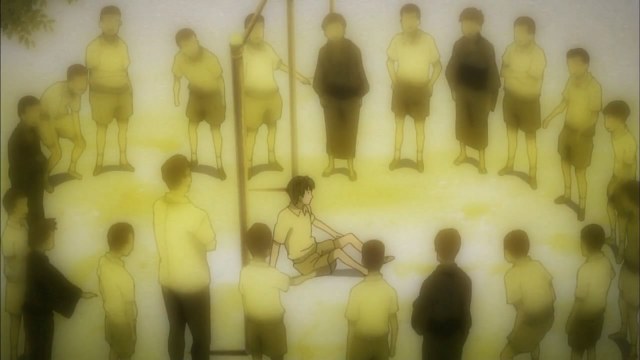
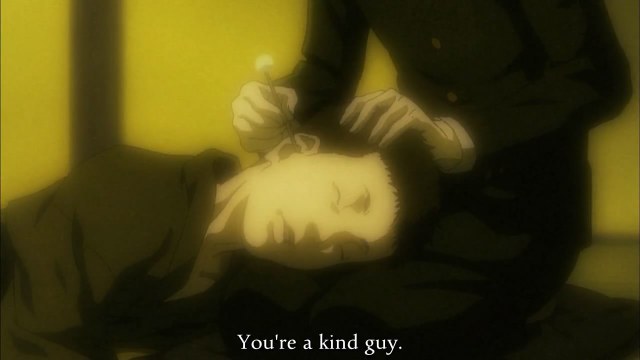
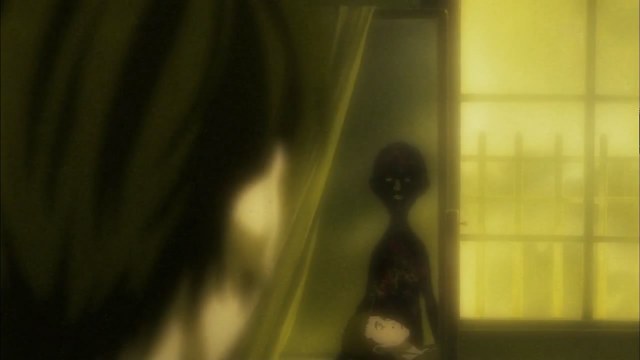
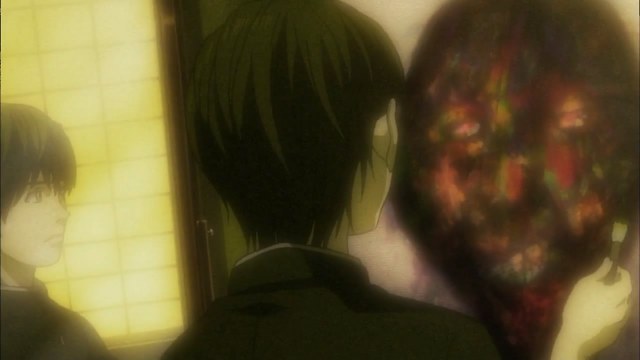
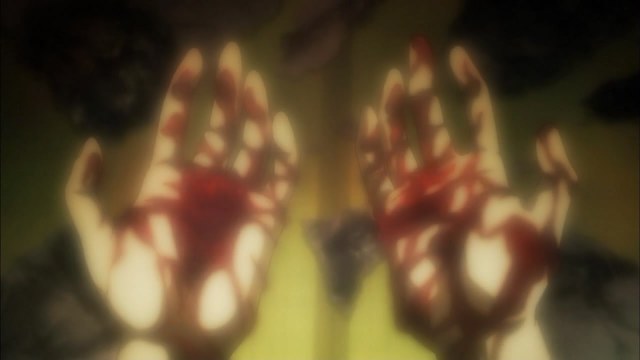
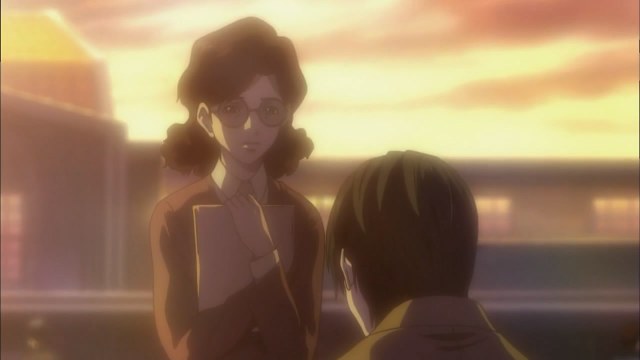



Another great post. Watching this episode I really felt the concept of monster reflected a feeling of alienation from human society. I like the way you underline the feeling of fear.
I thought the way the journalist guy treated the female journalist also underlined sexism, pressuring her into using her sex appeal to get Youzo to talk; I think that’s why she reacted so coldly to the idea of going to interview him (although she had a much more interesting stories of corruption to report about!) – have you watched Mononoke? There’s a female reporter that’s interesting to compar to that situation in the third arc.
The female reporter also obviously toyed with the idea of killing herself – perhaps she too feels like a monster? That would make yet another way in which she’s similar to Mayumi.
In Judeo-Christianity (I mention this only because it is what I am familiar with) Satan. “the enemy” is given the title “the prince of lies.”
You can make that Christianity. Judaism doesn’t really have a devil.
Satan means ‘the enemy’ — it doesn’t necessarily mean ‘the devil’ right? This is the same guy who shows up in the book of Job IIRC, so I had assumed such a figure exists in Judaism.
I haven’t seen Mononoke yet, but yeah I noticed the chauvinism in the whole news office. I felt that I couldn’t speak about it at length despite my forays in sexual politics in my recent post on Revolutionary Girl Utena.
The pattern will be played out, I imagine… as this seems to be a story who enjoys the conceit of symmetry.
That said, I can’t extend the monster metaphor to Mayumi or this reporter. They are characterized as victims of the monster, and not the monster itself… so far, at least.
Satan means the Adversary, or the Prosecutor. In the book of Job especially, he’s just seen as an Angel who’s job is to test humans so they pass them. He doesn’t work against the Lord. Okay, I guess he doesn’t entirely not exist, but there’s a complete difference of emphasis.
That said, I can’t extend the monster metaphor to Mayumi or this reporter. They are characterized as victims of the monster, and not the monster itself… so far, at least.
Hmm good point. Mayumi described herself as well as no longuer human so I thought it was enough to see her as a monster too (only in terms of being alienated from human society of course) but the show didn’t go that far so far.
By the way, I do look forward to your future posts on Utena (mostly because it’s one of my favourite show of all times :D). I highly reccomend Mononoke, btw, although I assume you might not really need more anime recs.
Thanks for the info re Satan.
I think I wrote one of the evilest sentences I’ve ever written lol.
I’m going to write about Touga, when inauthenticity goes on the offensive. He is quite the golden-tongued prince of lies himself.
animekritik translates Ninggen Shikkaku as “Disqualified as Human.” It gives a different meaning… or points towards something different compared to “no longer…” I’m not sure what though.
haha, yeah, inauthenticity (and delusions) definitely is also a theme of SKU, and Touga’s definitly one of the most skilled at using it offensively (although not the best :p).
“Disqualified” implies that there’s some… requirement to pass as humans. If you fail some specific kind of test then you don’t qualify as human?
There is an excellent anime called Monster. I could not stop thinking about it while watching this episode. Monster is not on your MAL, so I recommend that you watch it. I had previously recommended Higurashi, which is not on your MAL either. Until you watch Monster and Higurashi, I’m not recommending any more anime to you.
Monster is on my ‘on hold’ list, not because I don’t want to continue watching it only that I am bound by oath to watch it together with mechafetish which takes some logistics work to match schedules with (but this will change since I pirated his ass and we now work for the same corporation). We’re at episode 53 and it’s very, very good. He’s working on a post on the show, and I will do mine which will be contrasted with this — like you I can’t help but think of it as well.
As for Higurashi, I remember watching the first episode 2 years ago with mechafetish as well, we weren’t in the mood for it then, so I put off watching it so I didn’t put it on my MAL dropped list.
You also recommended Touch, which I intend to watch someday (I am still intimidated by its length, but I will get over this).
Great post – I found this episode all kinds of fascinating, its amazing how much depth Youzo’s character has in only two episodes. Its really interesting to watch him as even though Youzo himself feels detached from humanity and thinks himself a ‘monster’, he still draws people to him; although these women are every bit as broken as he himself is.
I’d also recommend Mononoke and Higurashi BTW!
I’m uncomfortable in using ‘depth’ as an adjective but yes Youzo is pretty interesting and perhaps well-exposed after two episodes. What I mean that it can take a pretty large number of episodes to flesh out a character, even a lead one. But Aoi Bungaku has proven to be both efficient and effective.
Van Gogh cut off his earlobe for PAUL GAUGUIN? We were always told in school that it was a woman lover. Once again I have to shake my fist at the sinister hetero agenda.
Great thoughts on No Longer Human, but unfortunately I’m a bit behind on that. Glad you like it, though.
It’s from Wikipedia, so take that for what it is. I recommend catching up with this ASAP as I would like to read your own thoughts on this work.
Can Paul Gauguin’s and Van Gogh’s relationship be considered homoerotic? This article http://www.guardian.co.uk/artanddesign/2009/may/04/vincent-van-gogh-ear makes it seem just a friendship between two lonely and not so sane people.
The explanation of the hero’s monstrosity is suberb. I just thought that the monster was a depiction of his unstable mentality and disassociation having roots in his rape on an young age.
Thank you. I can’t really say much now given how much I’ve forgotten about this, but I’m glad you enjoyed the show. I remember really liking it.